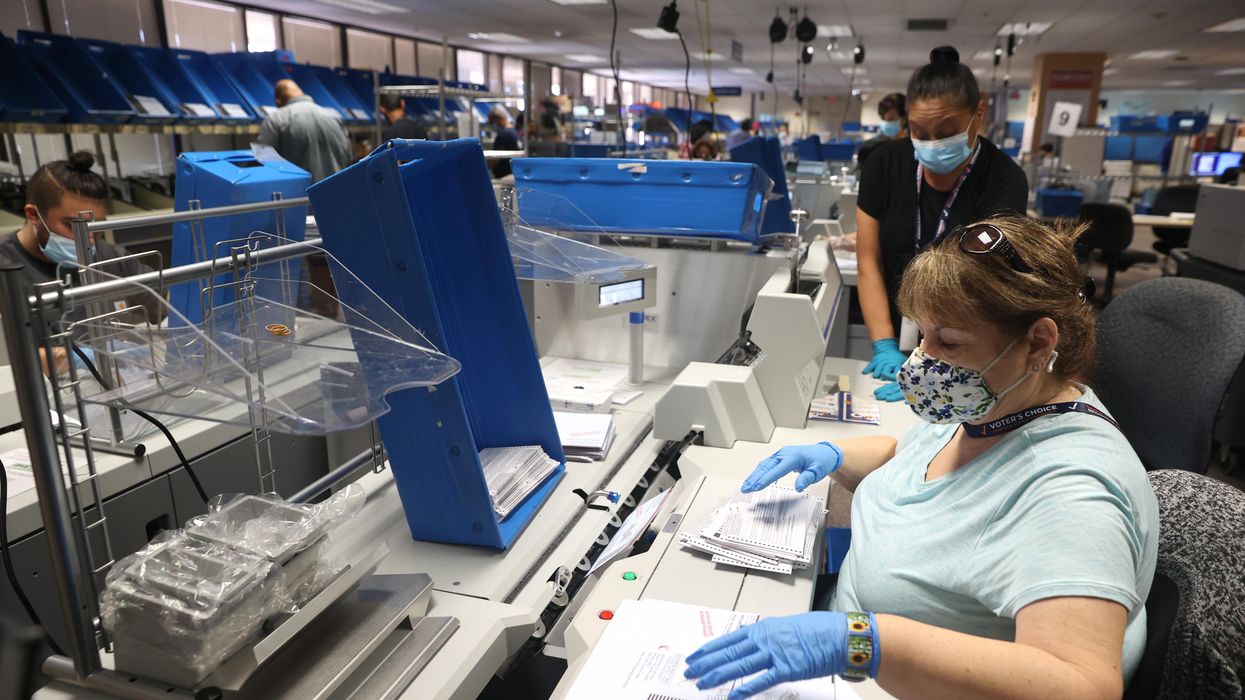During the 2020 presidential contest, election workers had to navigate a host of new challenges caused by the Covid-19 pandemic. As if that wasn't enough of a burden on civil servants, temporary workers and volunteers, they also faced heightened threats from partisan extremists.
And now, even 10 months after the election, officials are still at risk of physical and verbal assault, as well as new rules that limit their authority.
To help protect election workers from these intimidations, the Center for Election Innovation and Research announced Wednesday the launch of a bipartisan initiative to provide pro bono legal assistance and advice. The Election Official Legal Defense Network is led by David Becker, executive director of CEIR; Bob Bauer, former White House counsel during the Obama administration; and Ben Ginsberg, counsel to the George W. Bush campaign and Republican candidates.
Local and state election workers, from any jurisdiction in the country, can contact the legal defense network via an online form or a 24-hour hotline to request legal help at no cost. The network is also actively recruiting lawyers to grow its outreach and assistance to election officials.
"It's very important for this project going forward to send a clear message to election officials that what they do is absolutely critical for democracy," Ginsberg said. "We will do anything that we can, with the help of our volunteer lawyers ... to help out in any untoward attempts to intimidate and influence elections."
This year, new laws have been enacted by Republican-led Legislatures in Iowa, Georgia, Florida and Texas that prevent election officials from expanding voter access, like they did during last year's pandemic election. For instance, these states now have rules preventing election workers from proactively sending voters mail ballot applications, unless the voter has explicitly requested one.
Other recently enacted laws could penalize election officials with hefty fines or jail time for technical infractions of election rules, like opening a polling place late or leaving a ballot drop box unsupervised. Some states have also given more authority to partisan poll watchers, which could lead to increased tensions during elections and put the burden on election administrators to mitigate any issues.
Bauer and Ginsberg fear these types of laws could have a chilling effect on election officials, preventing them from carrying out their duties and impacting the integrity of elections.
"What we are seeing developing now is a huge step backward from a focus on professionalized election administration to a heavy level of political interference in the work of trained election professionals," Bauer said.
Brian Corley, supervisor of elections for Pasco County, Fla., said during a press call announcing the legal defense network that he and his colleagues have been subjected to a deluge of threats during and since the 2020 election.
"I can tell you that my staff was called racial slurs, not just once or twice — once or twice is already too many — we're talking 30, 40, 50 times. I had a staff member that was threatened to be shot, threatened to be beaten," Corley said. "I was called an enemy of the state, part of the deep state conspiracy, and that I was pulling for Joe Biden. What was my crime? Encouraging voters to consider voting by mail during a pandemic."
Corley said he also had to contact the Department of Homeland Security and the FBI after people showed up at his house to threaten him.
The continued intimidation of election workers this year has also led many to resign from their positions, which could spell staffing shortages for upcoming elections. Michael Winn, chief deputy clerk for Harris County, Texas, said during the press call that many of his colleagues have resigned recently over these issues.
"This is a national problem that needs to be addressed head on. This is not a set of isolated incidents or just the byproduct of a particularly complex and difficult election," Bauer said. "This has now become a concern for the electoral process."
Through the legal defense network, the co-chairs hope to provide election officials with the support system they need to mitigate these issues. Whether an administrator is threatened by someone or has concerns about a new law, they can contact one of the volunteer attorneys for assistance.
The Justice Department also announced in July the formation of a task force to address the increased threats against election workers.




















